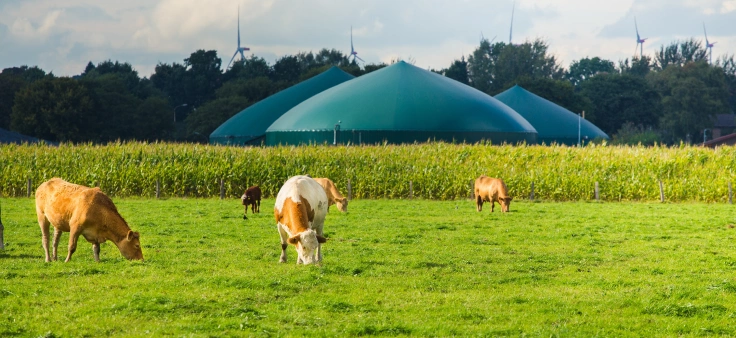
Biomethane is a second-generation (2G) biofuel obtained from biogas, which in turn is produced through a natural decomposition process (anaerobic digestion) of biodegradable organic agricultural, livestock, and industrial waste. Subsequently, this biogas is purified through a technological process called upgrading, and it is converted into biomethane.
Biomethane, during its life cycle, can reduce CO2 emissions by more than 90% compared to natural gas. Thanks to its similarity to natural gas, it can be stored or injected directly into the existing gas transmission network, without developing new infrastructure. Regarding its use, biomethane can be used as a substitute for natural gas for industrial use, in the production of green hydrogen and as an alternative for sustainable mobility.
Goal 2030
In Moeve we aims to produce biomethane from agricultural and livestock waste and manage a project portfolio of 4 TWh by 2030. The use of this renewable gas, instead of fossil fuels, will allow us to reduce CO2 emissions from its energy parks, chemical plants, ours strategic industrial clients and partners, as well as providing a complementary vector for green hydrogen production and promoting sustainable mobility.
The total production, equivalent to enough energy for 568,000 households, will result in the reuse of 10 million tons of waste per year and will prevent the emission of 728,000 tons of CO2 per year, similar to planting 48.5 million trees..
Manage project portfolio of
4 TWh
per year
Residuals revalorization
10 million
tons per year
Avoid the emission of
728.000 t
of CO2 / year
Biomethane plants: 100% sustainable
Biomethane plants are a sustainable alternative to waste treatment, as they allow waste to be reused to produce renewable energy and produce by-products such as compost or sustainable fertilizers that can be used on local farmland.
The production of renewable gases is in line with the REPowerEU initiative to reduce dependence on fossil fuels and CO2 emissions, as well as contribute to several of the Sustainable Development Goals of the 2030 Agenda: SDG 7 (Affordable and clean energy), SDG 8 (Decent work and economic growth), SDG 12 (Responsible consumption and production), and SDG 13 (Climate action).

Biomethane production partnerships
At Moeve, we invest in the search for and development of new projects to produce biomethane from agricultural and livestock waste. This new line of business will allow us to move forward in the process of decarbonizing our industrial activity.
-
-
In October 2023, we signed a partnership agreement with Kira Ventures to develop up to 15 biomethane plants over the course of this decade, the first 5 of which are expected to start operating between 2025 and 2026 in Castilla-La Mancha and Castilla y León. These facilities will be 100% sustainable as they will operate using renewable electricity and take advantage of the heat generated by the biogas itself.

-
In July 2024, we signed a partnership deal with PreZero Spain that will allow us to boost the biomethane market in Spain. The agreement includes the joint development of biomethane plants that use organic waste to produce renewable energy for the Andalusian Green Hydrogen Valley and the new second-generation biofuels complex that we are building in Huelva.

-
Agreement with InproEner to develop five biomethane plants in Spain, which are expected to be operational between 2028 and 2029.
Each facility will produce around 50 GWh per year, adding up to 250 GWh of biomethane annually.
This partnership includes a collaboration with EnviTec Biogas, which will contribute its experience in the construction of more than 650 biogas plants internationally.
-

